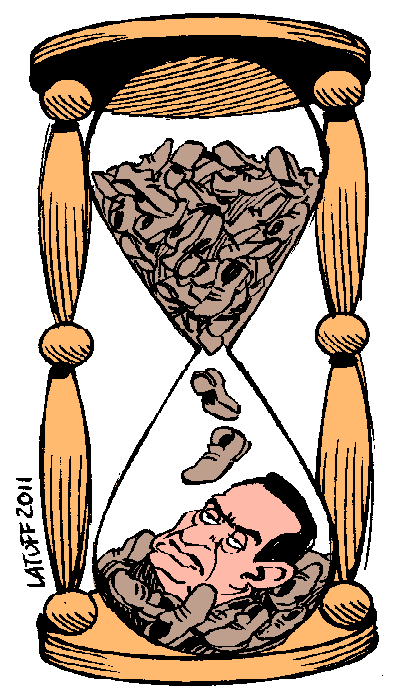Washington and the Political Opposition in Egypt
The United States shouldn't micromanage Egyptian politics.
 The Wall Street Journal (subscription may be required) reports that “a spectrum of opposition figures banded together to plan an alternative vision” to Mubarak’s regime well before the protests erupted last week. This advanced planning, which included “dozens of meetings lasting more than 100 hours” enabled the opposition to present a unified front. The shadow legislature’s 10-person steering committee quickly coalesced behind a single individual – Mohamed ElBaradei – to be the point person in negotiations with government. But the true power in Egypt is reflected in the parties and interest groups represented on that steering committee.
The Wall Street Journal (subscription may be required) reports that “a spectrum of opposition figures banded together to plan an alternative vision” to Mubarak’s regime well before the protests erupted last week. This advanced planning, which included “dozens of meetings lasting more than 100 hours” enabled the opposition to present a unified front. The shadow legislature’s 10-person steering committee quickly coalesced behind a single individual – Mohamed ElBaradei – to be the point person in negotiations with government. But the true power in Egypt is reflected in the parties and interest groups represented on that steering committee.
The Journal published the names and affiliations of the committee’s members in a helpful side bar:
- Mohamed ElBaradei: Former head of International Atomic Energy Agency, leader of Egypt's National Association for Change
- Mohammad Baltagi: Head of Muslim Brotherhood bloc of lawmakers from 2005 to 2010
- Hamdeen Sabahy: Head of the Karama Party, a secular, left-wing Arab Nationalist party
- Abdel Galil Mustafa: The coordinator for the National Association for Change, Mr. ElBaradei's group
- Mahmoud Al-Khudairi: Former vice president of Egypt's appeals court
- George Ishaq: Former head of the Kefaya protest movement, which led the protest against President Mubarak in 2005
- Abdel Ezz Hariri: Formerly of Tegammu, a secular leftist party
- Ayman Nour: Head of the liberal secular Ghad party. Ran against Mubarak in 2005 elections
- Magdy Ahmed Hussein: Head of the pro-Islamist Labor Party
- Osama Ghazali Harb: A former member of Mubarak's ruling NDP and Mubarak family confidant; left the party and founded the secular and liberal National Democratic Front. Editor in chief of Siyasat Dowlia, an Egyptian journal on international affairs
(The steering committee also included several youth groups, each of which was asked to send 3-5 members to the committee.)
It would be logical for readers to ask: Who among this list of names would we most like to see emerge as the next leader in Egypt? And what, if anything, can and should Washington do to make that happen?
I have a different question: Might it be better to avoid micromanaging Egyptians politics altogether?
Whenever a crisis ensues, in any country in the world, there will always be a hue and cry for the president to do something. This ignores the fact that many of these crises have nothing to do with the United States, and therefore that the United States has no obvious role in resolving them. Such cries for intervention also ignore the possibility that heavy-handed U.S. government involvement in the internal politics of foreign states often makes bad situations worse.
In this particular case, it is not true that Washington has no role to play in Egyptian politics. The U.S. government’s three-decade long support of the Egyptian government, especially the provision of tens of billions of dollars of U.S. taxpayer-funded aid, implicates Washington in all that that government does. Even when U.S. officials complain about a lack of political opportunity, the corruption that stifles economic development, or gross violations of basic human rights, such criticisms will inevitably fall short for those who are on the receiving end of these injustices.
But Washington’s “do something” impulse seems to be overpowering common sense. Having backed the wrong person for too long, there is now a countervailing urge to correct our past error by backing the “right” person this time around.
I have a different idea. We should step back and consider that our close relationship with Mubarak over the years created a vicious cycle, one that inclined us to cling tighter and tighter to him as opposition to him grew. And as the relationship deepened, U.S. policy seems to have become nearly paralyzed by the fear that the building anger at Mubarak’s regime would inevitably be directed at us.
We can’t undo our past policies of cozying up to foreign autocrats (the problem extends well beyond Egypt) over the years. And we won’t make things right by simply shifting --or doubling or tripling -- U.S. foreign aid to a new leader. We should instead be open to the idea that an arms-length relationship might be the best one of all.
Image (c) Carlos Latuff
